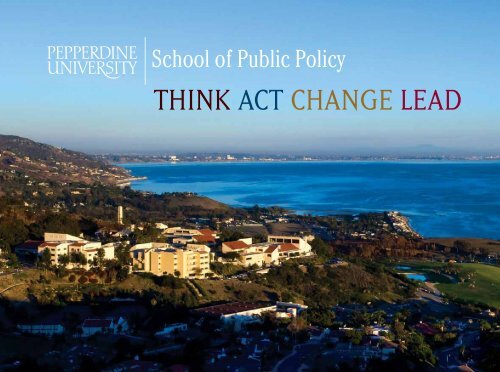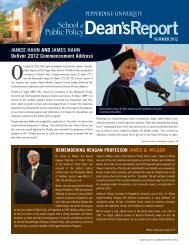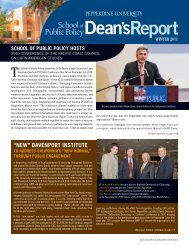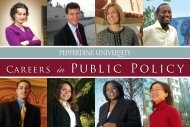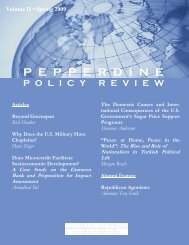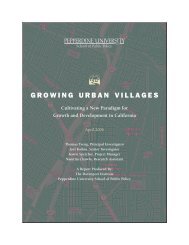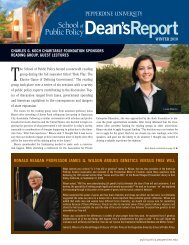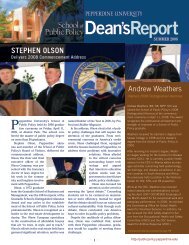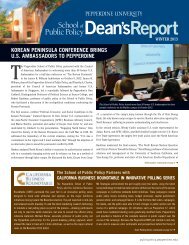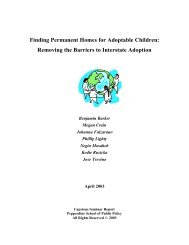think act change lead - Pepperdine University School of Public Policy
think act change lead - Pepperdine University School of Public Policy
think act change lead - Pepperdine University School of Public Policy
Create successful ePaper yourself
Turn your PDF publications into a flip-book with our unique Google optimized e-Paper software.
THINK ACT CHANGE LEAD
Choosing just<br />
the right graduate<br />
program<br />
is important because it can<br />
dramatically skew a whole<br />
lifetime <strong>of</strong> subsequent<br />
doors that are opened or<br />
closed. Some students are<br />
eager to develop skills as<br />
analysts, and their work is<br />
critical. I meet others who<br />
are prepared to combine<br />
these analytic tools with organizational talents<br />
to leverage their work through the <strong>act</strong>ivities <strong>of</strong><br />
other people, and are <strong>of</strong>ten recruited by both<br />
the public and private sectors. Others, perhaps<br />
an even smaller group, guided by a confident<br />
strength <strong>of</strong> moral purpose, are able to design<br />
and inspire organizations that not only create<br />
value for those they serve, but make meaning<br />
for those they <strong>lead</strong>. It is precisely this last<br />
group who seem to thrive most in the rarefied<br />
atmosphere <strong>of</strong> the <strong>Pepperdine</strong> program.<br />
James R. Wilburn<br />
Dean, <strong>School</strong> <strong>of</strong> <strong>Public</strong> <strong>Policy</strong><br />
publicpolicy.pepperdine.edu
THINK<br />
ACT<br />
CHANGE<br />
Whatever one’s political views, those who<br />
shape public policy today are confronted<br />
by challenges <strong>of</strong> unprecedented<br />
magnitude. In no other field is there a<br />
greater need for the moral, ethical, and<br />
spiritual paradigm that the founding<br />
mission and enduring philosophy <strong>of</strong><br />
<strong>Pepperdine</strong> <strong>University</strong> encourages. This<br />
strong focus on the student’s char<strong>act</strong>er<br />
as the heart <strong>of</strong> the educational enterprise<br />
is especially fitted to nurture the next<br />
generation <strong>of</strong> policy <strong>lead</strong>ers.<br />
At <strong>Pepperdine</strong> <strong>University</strong>, the approach toward<br />
the increasingly important interdisciplinary field<br />
<strong>of</strong> public policy is student-centered, innovative,<br />
and distinctive in several ways:<br />
h<strong>Public</strong> h policy is not limited to the study <strong>of</strong><br />
government solutions, but is broadened to embrace<br />
a full range <strong>of</strong> community-based and free market<br />
approaches to public policy challenges.<br />
hEffective h public policy solutions are rooted in<br />
the classic literature <strong>of</strong> history, philosophy, and<br />
economics, and are guided by moral and ethical<br />
principles best captured in the lives <strong>of</strong> great<br />
<strong>lead</strong>ers.<br />
hThe h teaching <strong>of</strong> public policy goes beyond the<br />
theoretical survey <strong>of</strong> problems, highlighting policy<br />
applications that have proven to be effective.<br />
hMany h policy challenges are best resolved at state<br />
and local levels. Southern California and Los<br />
Angeles provide an ideal laboratory in which to<br />
study such issues.<br />
LEAD<br />
<strong>Pepperdine</strong> <strong>University</strong><br />
Mission Statement<br />
1<br />
<strong>Pepperdine</strong><br />
<strong>University</strong><br />
<strong>School</strong> <strong>of</strong><br />
<strong>Public</strong> <strong>Policy</strong><br />
<strong>Pepperdine</strong> is a Christian university<br />
committed to the highest standards <strong>of</strong><br />
academic excellence and Christian values,<br />
where students are strengthened for lives<br />
<strong>of</strong> purpose, service, and <strong>lead</strong>ership.
2<br />
Why Study<br />
<strong>Public</strong> <strong>Policy</strong>?<br />
Today’s dynamic economic, political, and<br />
social climate demands a new generation<br />
<strong>of</strong> <strong>lead</strong>ers who can meet the needs <strong>of</strong><br />
our rapidly evolving public and civic<br />
institutions. The <strong>Pepperdine</strong> <strong>School</strong> <strong>of</strong><br />
<strong>Public</strong> <strong>Policy</strong> aims to equip students<br />
for this challenging role with <strong>lead</strong>ership<br />
skills rooted in time-tested concepts and<br />
values, as well as a progressive knowledge<br />
<strong>of</strong> globalism, technology, ethics, and<br />
uncertainty.<br />
why <strong>Pepperdine</strong>?<br />
Program<br />
<strong>Pepperdine</strong> is committed to nurturing<br />
<strong>lead</strong>ers who can use tools <strong>of</strong> analysis and<br />
design to effect real <strong>change</strong>, not only in<br />
government agencies, but also in the private<br />
and nonpr<strong>of</strong>it sectors.<br />
Beyond useful tools, this requires critical<br />
insights produced only by a broad<br />
understanding <strong>of</strong> the history and philosophy<br />
undergirding free institutions and an exposure<br />
to great ideas, courageous <strong>think</strong>ers, and<br />
extraordinary <strong>lead</strong>ers. It is based on the<br />
conviction that culture and personal moral<br />
certainties are also the valid concern <strong>of</strong> higher<br />
education—in f<strong>act</strong>, an important foundation<br />
for analysis. This significant and unique<br />
perspective is reflected in the core curriculum,<br />
unashamedly setting it apart from many other<br />
public policy programs.<br />
Core Curriculum<br />
hThe h Roots <strong>of</strong> American Order:<br />
What Is <strong>Public</strong> <strong>Policy</strong>?<br />
hEthical h Dimensions <strong>of</strong> <strong>Public</strong> <strong>Policy</strong>:<br />
Great Books and Great Ideas<br />
hApplied h Economic Analysis <strong>of</strong> <strong>Public</strong> <strong>Policy</strong> I<br />
hApplied h Economic Analysis <strong>of</strong> <strong>Public</strong> <strong>Policy</strong> II<br />
hApplied h Research Methods in <strong>Public</strong> <strong>Policy</strong><br />
hPolitical, h Organizational, and Strategic Aspects<br />
<strong>of</strong> <strong>Public</strong> <strong>Policy</strong><br />
hRequired h Internship or Field Study<br />
h<strong>Policy</strong> h Research Seminar (Capstone)<br />
<strong>Pepperdine</strong> is committed to an education<br />
that values the role that businesses, labor<br />
associations, nonpr<strong>of</strong>it organizations, local<br />
schools, and families, as well as churches,<br />
synagogues, and mosques, play in shaping<br />
the public arena. Students are empowered to<br />
engage these core institutions to confront the<br />
big questions <strong>of</strong> today and arrive at versatile<br />
solutions.<br />
The Master <strong>of</strong> <strong>Public</strong> <strong>Policy</strong> (MPP) at <strong>Pepperdine</strong><br />
is a full-time, residential program that requires<br />
64 units <strong>of</strong> course work, or four 4-unit courses<br />
each semester for two academic years (four<br />
semesters). The first year is composed primarily<br />
<strong>of</strong> core courses and provides a foundation for<br />
the student’s specialization courses, most <strong>of</strong><br />
which are taken in the second year, in addition<br />
to a required summer internship.<br />
Students are drawn to the <strong>School</strong> <strong>of</strong> <strong>Public</strong><br />
<strong>Policy</strong> at <strong>Pepperdine</strong> because they seek a place<br />
that nurtures their need to make a pr<strong>of</strong>ound<br />
difference.<br />
publicpolicy.pepperdine.edu
Ted McAllister<br />
Edward L. Gaylord Chair/Associate Pr<strong>of</strong>essor<br />
<strong>of</strong> <strong>Public</strong> <strong>Policy</strong>, <strong>School</strong> <strong>of</strong> <strong>Public</strong> <strong>Policy</strong>,<br />
<strong>Pepperdine</strong> <strong>University</strong><br />
THINK<br />
<strong>Pepperdine</strong>’s <strong>School</strong> <strong>of</strong> <strong>Public</strong> <strong>Policy</strong> is a singular place—a<br />
place to ask hard questions, to explore ideas with intellectual<br />
intensity, and to address perplexing problems without<br />
recourse to formulas. I teach, research, and write in an<br />
environment unusually rich with diverse <strong>think</strong>ers, competing<br />
methods, and contrasting academic disciplines.<br />
3<br />
Our economists produce elegant and abstr<strong>act</strong> models, our<br />
political theorists rigorously push back our inquiry to first<br />
principles and to the political and moral problems that form<br />
the basis <strong>of</strong> all political life, and our historians explore the<br />
particular and ever changing circumstances that provide the<br />
historical horizon <strong>of</strong> our own times and our policy challenges.<br />
The hard work <strong>of</strong> analyzing and making policy is, for us,<br />
shaped by this more comprehensive education in which<br />
we inspire not ideologues or analysts, but principled and<br />
skilled <strong>lead</strong>ers. Our program attr<strong>act</strong>s students passionate to<br />
understand the pressing problems <strong>of</strong> our time and to forge<br />
meaningful and helpful responses to these problems.<br />
My students inspire me every year to develop connections<br />
between theory and pr<strong>act</strong>ice, between ideas and <strong>act</strong>ion. I<br />
know <strong>of</strong> no other school with this sort <strong>of</strong> intellectual and<br />
pr<strong>act</strong>ical dynamism.
4<br />
Areas <strong>of</strong><br />
Specialization<br />
In addition to a robust and broad <strong>of</strong>fering <strong>of</strong><br />
core courses, students are <strong>of</strong>fered a choice<br />
<strong>of</strong> four distinct specializations for their<br />
elective courses. Students in good standing<br />
may add versatility to the curriculum by<br />
choosing to double specialize without<br />
adding any additional units to the program.<br />
American Politics<br />
The American politics specialization analyzes<br />
the dynamic nature <strong>of</strong> American society and<br />
considers the political, economic, and social<br />
implications <strong>of</strong> federal and local policies. It<br />
includes the development <strong>of</strong> skills in building<br />
consensus among a variety <strong>of</strong> constituents<br />
affected by new policy initiatives. Courses<br />
include:<br />
hAmerican h Democratic Culture<br />
hAmerican h Strategies in World Politics<br />
hContemporary h<br />
American Ideologies<br />
hOpinions, h Passions, and Interests<br />
hThe h Political Biography <strong>of</strong> a New <strong>Policy</strong><br />
h<strong>Public</strong> h <strong>Policy</strong> and Education in America<br />
h<strong>Public</strong> h <strong>Policy</strong> and the Family<br />
h<strong>Public</strong> h <strong>Policy</strong> and the Legal Framework<br />
h<strong>Public</strong> h <strong>Policy</strong> in Modern America<br />
h<strong>Public</strong> h <strong>Policy</strong> and Political Economy<br />
Economics<br />
The economics specialization examines<br />
such policies as urban and global issues, the<br />
evaluation <strong>of</strong> law and public policy, regional<br />
and metropolitan growth, and the role <strong>of</strong><br />
government in a market economy. Courses<br />
include:<br />
hApplied h Econometrics<br />
hApplied h Research Methods<br />
hCriminal h Justice<br />
hDevelopment h<br />
<strong>of</strong> American Economic Institutions<br />
and Policies<br />
hGlobal h Economics<br />
hInternational h<br />
Aid<br />
hLabor h Economics<br />
hLaw h and Economics<br />
h<strong>Public</strong> h Finance and <strong>Public</strong> Choice<br />
hSeminar h in Economic Policies: The Economics and<br />
<strong>Policy</strong> <strong>of</strong> Science and Innovation<br />
h<strong>Public</strong> h <strong>Policy</strong> and Religion<br />
h<strong>Public</strong> h <strong>Policy</strong> and Social Regulation<br />
hSeminar h in Political Issues<br />
hSeminar h in Economic Policies: Latin American<br />
Economic Development<br />
hSocial h <strong>Policy</strong><br />
hUrban h and Regional Economics<br />
publicpolicy.pepperdine.edu
International Relations<br />
State and Local <strong>Policy</strong><br />
<strong>Policy</strong> Spotlight<br />
The international relations specialization traces<br />
a new role for U.S. <strong>lead</strong>ership including studies<br />
in statesmanship; global alliances; and U.S.<br />
relations to such areas as Latin America, Asia,<br />
Africa, the Middle East, or Eastern Europe.<br />
Courses include:<br />
hBusiness-Government h<br />
Cooperation<br />
hComparative h<br />
Democracy and Federalism<br />
hContemporary h<br />
Issues in American Foreign <strong>Policy</strong><br />
hContending h<br />
Approaches to International Politics<br />
hInternational h<br />
Conflict Management<br />
hInternational h<br />
Institutions and the New Diplomacy<br />
hNational h Security and Freedom<br />
hPrudence h in Politics<br />
hRegion-Specific h<br />
Studies<br />
hSeminar h in International Relations<br />
hStatecraft h from Machiavelli to Kissinger<br />
and Beyond<br />
The state and local specialization teaches<br />
students how regions grow, develop, and can be<br />
effectively governed. Today, governors, mayors,<br />
and other municipal and business <strong>lead</strong>ers<br />
are creating many <strong>of</strong> the most innovative<br />
and effective policy initiatives at local levels.<br />
Courses include:<br />
hThe h Financing <strong>of</strong> Local and Regional Government<br />
hPermissions, h<br />
Development, and the Environment<br />
hPolicies h Past and Present: The History and Wealth<br />
<strong>of</strong> Cities<br />
h<strong>Policy</strong> h Relationships <strong>of</strong> State and Local Government<br />
hRegional h Governing Institutions<br />
hRegional h Policies: Southern California<br />
as a World Microcosm<br />
hSeminar h in Regional Policies: Children, Families,<br />
and Communities<br />
hSeminar h in Regional Policies: Deliberative<br />
Democracy<br />
The public policy program<br />
at <strong>Pepperdine</strong> <strong>of</strong>fers<br />
concentrations in specific<br />
fields <strong>of</strong> public policy. After<br />
choosing my specializations:<br />
economics and international<br />
relations, I discovered that I<br />
truly enjoyed learning how<br />
to use economic tools to<br />
solve policy related issues and decided to<br />
continue my studies in this field. <strong>Pepperdine</strong><br />
equipped me with a very important set <strong>of</strong><br />
skills that well prepared me for a career in<br />
teaching. I’ve learned how to <strong>think</strong> critically,<br />
evaluate policies, conduct research, analyze<br />
results, and honed my communication skills,<br />
both oral and written. At <strong>Pepperdine</strong>, I was<br />
provided the unique opportunity to learn<br />
and build close relationships from very<br />
talented and focused pr<strong>of</strong>essors, while being<br />
supported by dedicated staff who were<br />
genuinely interested in my pr<strong>of</strong>essional and<br />
personal development.<br />
5<br />
hStudies h in United States Relations with<br />
Other Nations<br />
hWar, h Strategy, Democracy, and Politics<br />
Liaoliao Li<br />
hThe h World Leadership Role <strong>of</strong> the United States<br />
hMPP, h <strong>Pepperdine</strong> <strong>University</strong>, 2004<br />
hAssistant h Pr<strong>of</strong>essor at the College <strong>of</strong> Business,<br />
Kutztown <strong>University</strong>, Pennsylvania<br />
hBA, h Business Administration, Southwestern<br />
<strong>University</strong> <strong>of</strong> Finance and Economics, China<br />
hPhD, h Economics, Southern Illinois <strong>University</strong>,<br />
Carbondale
6<br />
<strong>Policy</strong> Spotlight<br />
I came to <strong>Pepperdine</strong><br />
<strong>University</strong> because <strong>of</strong> my<br />
interest in learning how<br />
policies are implemented at<br />
the local, state, and federal<br />
level, with a particular<br />
desire to advocate for<br />
Native American issues. My<br />
joint degree in public policy<br />
and dispute resolution has provided me with<br />
the research analysis capability, knowledge<br />
in cross cultural conflict, mediation skills,<br />
as well as presentation technique that I<br />
could not have found anywhere else. Today,<br />
I am fulfilling my goal <strong>of</strong> advocating and<br />
promoting the common welfare <strong>of</strong> American<br />
Indians and Alaskan Natives.<br />
Jennine Stebing<br />
hMPP/MDR, h <strong>Pepperdine</strong> <strong>University</strong>, 2009<br />
hTheodore h J. Forstmann Scholar<br />
hProgram h Associate, National Congress <strong>of</strong><br />
American Indians<br />
hBA, h Spanish and Latin American Studies,<br />
<strong>University</strong> <strong>of</strong> Arizona<br />
Joint Degree<br />
Programs<br />
The <strong>School</strong> <strong>of</strong> <strong>Public</strong> <strong>Policy</strong> <strong>of</strong>fers joint<br />
degree programs with the Graziadio <strong>School</strong><br />
<strong>of</strong> Business and Management; and the<br />
<strong>Pepperdine</strong> <strong>School</strong> <strong>of</strong> Law and its Straus<br />
Institute for Dispute Resolution. These<br />
joint degree programs permit the student<br />
to complete two degrees in less time than<br />
would be ordinarily required if the programs<br />
were pursued separately. Joint degree<br />
programs <strong>of</strong>fered include:<br />
hMPP/Master h<br />
<strong>of</strong> Business Administration (MBA)<br />
The joint MPP/MBA program provides an enriched<br />
<strong>lead</strong>ership experience by focusing on management<br />
capabilities, <strong>lead</strong>ership qualities, and a commitment<br />
to utilizing the tools <strong>of</strong> analysis and policy design to<br />
effect successful implementation and institutional<br />
<strong>change</strong>.<br />
hMPP/Juris h Doctor (JD)<br />
The joint MPP/JD program is designed to<br />
strengthen and perfect the preparation <strong>of</strong> those<br />
whose successful <strong>lead</strong>ership depends on a fuller<br />
understanding and stronger skill set for addressing<br />
issues <strong>of</strong> public policy in the pr<strong>act</strong>ice <strong>of</strong> law or in<br />
the interface between the private sector and an<br />
increasingly complex government.<br />
hMPP/Master h<br />
<strong>of</strong> Dispute Resolution (MDR)<br />
The joint MPP/MDR program builds on expert<br />
study in negotiation, mediation, and arbitration<br />
processes, while exploring the ethical and moral<br />
rules by which we guide our direction as a nation<br />
and as a people.<br />
Internships<br />
Students pursue internships related to their<br />
area <strong>of</strong> specialization as a requirement for<br />
graduation, working in such environments<br />
as local, state, or federal government;<br />
a nonpr<strong>of</strong>it agency; or an international<br />
experience in a non-U.S. setting. After<br />
completing the internship requirement,<br />
faculty evaluate students’ internship<br />
experiences and students prepare a<br />
substantive report related to their<br />
internship experience.<br />
Career Services<br />
Career Services helps to facilitate regional,<br />
state, national, and global internships<br />
that enable students to apply their<br />
classroom work to <strong>act</strong>ual public policy<br />
situations. The goal <strong>of</strong> career services<br />
is to equip students with the tools to<br />
manage their own career planning efforts.<br />
This is accomplished through various<br />
pr<strong>of</strong>essional development workshops,<br />
alumni networking seminars, and employer<br />
information sessions, as well as an online<br />
searchable job and internship database.<br />
publicpolicy.pepperdine.edu
Alyson Price<br />
Student, <strong>School</strong> <strong>of</strong> <strong>Public</strong> <strong>Policy</strong>, <strong>Pepperdine</strong> <strong>University</strong><br />
Theodore J. Forstmann Scholar<br />
BA, Political Science, Chapman <strong>University</strong><br />
ACT<br />
I always thought my BA in political science would <strong>lead</strong> me to<br />
law school. Then I realized that it was not necessarily being an<br />
advocate <strong>of</strong> the law through negotiation or litigation that I wanted<br />
to pursue. I wanted to affect real <strong>change</strong> in policies and their<br />
implementation. I began to look at public policy programs because<br />
I wanted to learn the quantitative and economic skills needed to<br />
secure public policy.<br />
7<br />
One <strong>of</strong> the aspects that drew me to <strong>Pepperdine</strong>’s rigorous,<br />
two-year program was the required internship experience that<br />
is typically done in the summer. So many other public policy<br />
programs require internships during class time, and I knew a<br />
summer internship would allow for a more in-depth pr<strong>act</strong>ice<br />
and give me the time needed to fully experience the learning<br />
environment outside the classroom.<br />
As a policy advisor during my internship with the Orange County<br />
Board <strong>of</strong> Supervisors, I was able to successfully utilize and<br />
implement the skills I acquired during my first year at <strong>Pepperdine</strong><br />
when writing memos and performing data analysis. The internship<br />
experience has opened my eyes to the breadth <strong>of</strong> public policy and<br />
helped me define my potential future role in the policy world.
8<br />
<strong>Policy</strong> Spotlight<br />
My students have a passion to learn<br />
about public policy and strive to make<br />
a difference, making my job ever so<br />
rewarding. Because <strong>of</strong> this, I want to help<br />
them to better understand the world and<br />
be able to make more educated decisions<br />
in the policymaking process. I challenge my<br />
students to question the current system<br />
and to be able to form their judgment on<br />
specific issues. I know that through the<br />
concepts and material covered in class,<br />
my students will be effective agents <strong>of</strong><br />
<strong>change</strong>, play an important role in society,<br />
and will look back at the unique moral and<br />
ethical approach they were taught when<br />
considering policy decisions.<br />
Luisa Blanco<br />
Assistant Pr<strong>of</strong>essor <strong>of</strong> Economics<br />
<strong>School</strong> <strong>of</strong> <strong>Public</strong> <strong>Policy</strong>,<br />
<strong>Pepperdine</strong> <strong>University</strong><br />
Faculty<br />
The faculty <strong>of</strong> the <strong>School</strong> <strong>of</strong> <strong>Public</strong><br />
<strong>Policy</strong> is drawn from <strong>lead</strong>ing academics<br />
and pr<strong>act</strong>itioners in the various fields<br />
<strong>of</strong> public policy. Faculty members are<br />
carefully chosen for their high academic<br />
qualifications, their real-world orientation,<br />
and their philosophical congruence with<br />
the values <strong>of</strong> the school. The school’s view<br />
<strong>of</strong> teaching and scholarship integrates<br />
instruction with research, focuses on the<br />
student, and makes informed, pr<strong>act</strong>ical<br />
applications at all levels <strong>of</strong> planning and<br />
decision making.<br />
publicpolicy.pepperdine.edu
Distinguished<br />
Visiting<br />
Pr<strong>of</strong>essors<br />
A unique feature <strong>of</strong> the school is<br />
the involvement <strong>of</strong> distinguished<br />
public policy scholars and<br />
pr<strong>act</strong>itioners.<br />
Victor Davis Hanson<br />
Spring 2009 William E. Simon<br />
Distinguished Visiting Pr<strong>of</strong>essor<br />
Victor Davis Hanson is the Martin<br />
and Illie Anderson Senior Fellow in<br />
Residence in Classics and Military<br />
History at the Hoover Institution,<br />
Stanford <strong>University</strong>; and Pr<strong>of</strong>essor<br />
Emeritus <strong>of</strong> Classics at California State <strong>University</strong>,<br />
Fresno. Among numerous awards, honors, and<br />
fellowships, Hanson was awarded the National<br />
Humanities Medal and the Bradley Prize. He is<br />
the author <strong>of</strong> hundreds <strong>of</strong> articles, book reviews,<br />
scholarly papers, and newspaper editorials on<br />
matters ranging from ancient Greek, agrarian, and<br />
military history to foreign affairs, domestic politics,<br />
and contemporary culture.<br />
Wilfred M. McClay<br />
Michael Novak<br />
2002 John M. Olin<br />
Distinguished Visiting Pr<strong>of</strong>essor<br />
Theologian, author, and former U.S.<br />
Ambassador Michael Novak holds<br />
the George Frederick Jewett Chair<br />
in Religion, Philosophy, and <strong>Public</strong><br />
<strong>Policy</strong> at the American Enterprise<br />
Institute. In addition, Novak has written some 26<br />
influential books that have been translated into all<br />
major languages. He researches the three systems <strong>of</strong> a<br />
free society—the free polity, the free economy, and the<br />
culture <strong>of</strong> liberty—and their sources in religion and<br />
philosophy.<br />
James Q. Wilson<br />
Ronald Reagan<br />
Pr<strong>of</strong>essor <strong>of</strong> <strong>Public</strong> <strong>Policy</strong><br />
9<br />
2009-2010 William E. Simon<br />
Distinguished Visiting Pr<strong>of</strong>essor<br />
Wilfred M. McClay is the SunTrust<br />
Bank Chair <strong>of</strong> Excellence in<br />
Humanities at the <strong>University</strong> <strong>of</strong><br />
Tennessee at Chattanooga, where he<br />
is also pr<strong>of</strong>essor <strong>of</strong> history. He is a<br />
senior scholar at the Woodrow Wilson International<br />
Center for Scholars in Washington, D.C., and senior<br />
fellow at the Ethics and <strong>Public</strong> <strong>Policy</strong> Center. McClay<br />
has been the recipient <strong>of</strong> fellowships from the<br />
Woodrow Wilson International Center for Scholars, the<br />
National Endowment for the Humanities, the National<br />
Academy <strong>of</strong> Education, the Howard Foundation, the<br />
Earhart Foundation, and the Danforth Foundation.<br />
Former Shattuck Pr<strong>of</strong>essor <strong>of</strong><br />
Government at Harvard <strong>University</strong><br />
and the James Collins Pr<strong>of</strong>essor <strong>of</strong><br />
Management at the <strong>University</strong> <strong>of</strong><br />
California, Los Angeles, Anderson<br />
Graduate <strong>School</strong> <strong>of</strong> Management, James Q. Wilson<br />
also served as president <strong>of</strong> the American Political<br />
Science Association and has authored more than a<br />
dozen books on public policy. He holds the nation’s<br />
highest civilian honor, the Presidential Medal <strong>of</strong><br />
Freedom. Wilson was honored by the Lynde and<br />
Harry Bradley Foundation as a recipient <strong>of</strong> the 2007<br />
Bradley Prize.
10<br />
Lectures,<br />
Conferences,<br />
and Symposia<br />
Each year, the <strong>School</strong> <strong>of</strong> <strong>Public</strong> <strong>Policy</strong> hosts<br />
dozens <strong>of</strong> noteworthy visiting scholars,<br />
public- and private-sector <strong>of</strong>ficials, and<br />
policy <strong>lead</strong>ers who address the <strong>Pepperdine</strong><br />
community. Students gain the opportunity<br />
to inter<strong>act</strong> and have intimate conversations<br />
with <strong>lead</strong>ers responsible for shaping policy<br />
in their respective spheres <strong>of</strong> influence.<br />
Many <strong>of</strong> the distinguished guest speakers<br />
have visited the <strong>School</strong> <strong>of</strong> <strong>Public</strong> <strong>Policy</strong><br />
through the Charles and Rosemary Licata<br />
Lecture Series, which unites students,<br />
alumni, and community <strong>lead</strong>ers with <strong>lead</strong>ing<br />
academics who are forming policy matters<br />
in the new century.<br />
The <strong>School</strong> is also host to conferences on<br />
Faith and <strong>Public</strong> <strong>Policy</strong> where <strong>lead</strong>ing<br />
<strong>think</strong>ers, pr<strong>act</strong>itioners, and theologians are<br />
invited to discuss the dynamic and vital<br />
relationship between faith and public policy.<br />
Davenport<br />
Institute<br />
<strong>Pepperdine</strong>’s Davenport Institute addresses<br />
key issues through major conferences and<br />
seminars and widely acclaimed research<br />
publications. Through its <strong>act</strong>ivities, students<br />
gain experience as research assistants and<br />
project directors, and are exposed to the<br />
most current topics and policy <strong>think</strong>ers.<br />
<strong>Pepperdine</strong><br />
<strong>Policy</strong> Review<br />
The <strong>Pepperdine</strong> <strong>Policy</strong> Review is a studentrun<br />
journal that showcases the best<br />
scholarly work <strong>of</strong> <strong>School</strong> <strong>of</strong> <strong>Public</strong> <strong>Policy</strong><br />
students at <strong>Pepperdine</strong> <strong>University</strong>. It<br />
features articles, commentaries, opinion<br />
pieces, and book reviews that address<br />
a variety <strong>of</strong> issues from health care and<br />
national security to political philosophy.<br />
Student<br />
Organizations<br />
and<br />
Cocurricular<br />
Activities<br />
A number <strong>of</strong> student organizations<br />
and opportunities exist on campus<br />
for students to complement<br />
their academic studies. Student<br />
organizations have hosted an array<br />
<strong>of</strong> guest speakers, panels, debates,<br />
election viewing and analysis,<br />
and cultural events. Community<br />
involvement is also important to<br />
student organizations as they have<br />
coordinated food and clothing drives<br />
and hosted various other fundraising<br />
events to benefit local charities and<br />
organizations.<br />
Student Organizations:<br />
hChristianity h<br />
and <strong>Public</strong> <strong>Policy</strong><br />
hThe h Churchill Society<br />
hWomen h in <strong>Public</strong> <strong>Policy</strong><br />
publicpolicy.pepperdine.edu
Erika Lewis<br />
MPP, <strong>Pepperdine</strong> <strong>University</strong>, 2009<br />
Thomas P. Kemp Scholar<br />
U.S. Consular Officer, Ciudad Juarez, Mexico,<br />
U.S. Department <strong>of</strong> State<br />
BA, International Relations, Howard <strong>University</strong><br />
CHANGE<br />
11<br />
<strong>Public</strong> policy is one <strong>of</strong> the most important fields <strong>of</strong> study<br />
today as federal, state, and local government decisions touch<br />
the lives <strong>of</strong> informed and uninformed citizens alike. Whether<br />
a business is working to decrease its costs <strong>of</strong> capital, a family<br />
is trying to decrease its health care costs, or an individual<br />
is making a real estate purchase in light <strong>of</strong> property taxes,<br />
public policy contributes greatly to the shape <strong>of</strong> our world.<br />
The faculty at the <strong>School</strong> <strong>of</strong> <strong>Public</strong> <strong>Policy</strong> has fully prepared<br />
me for my career as a U.S. foreign service <strong>of</strong>ficer, through<br />
challenging me to re<strong>think</strong> ideas I had on policy issues so that<br />
I could present a more robust case. Exposed to their vast<br />
research topics and insightful conversations in and out <strong>of</strong><br />
the classroom, their instruction and counseling have helped<br />
transform me into a thoughtful and effective <strong>lead</strong>er.
Admission<br />
Apply on-line at:<br />
Financial Aid<br />
12<br />
All applicants are evaluated on their<br />
undergraduate course work and grade<br />
point average, accepted standardized<br />
test scores, essays, career interests,<br />
recommendations, and breadth <strong>of</strong><br />
background and work experience. The<br />
<strong>School</strong> <strong>of</strong> <strong>Public</strong> <strong>Policy</strong> encourages<br />
applications from graduates <strong>of</strong> regionally<br />
accredited institutions in all areas <strong>of</strong> study.<br />
Application Checklist<br />
In order to process a file, it must include all <strong>of</strong> the following:<br />
Completed application form<br />
Personal statement<br />
Moral/ethical dilemma essay<br />
Résumé<br />
Official transcripts from all undergraduate and graduate course work<br />
Two letters <strong>of</strong> recommendation<br />
publicpolicy.pepperdine.edu<br />
Students are accepted for fall admission<br />
only. The completed application deadline<br />
for fall admission is May 1. However, early<br />
application is encouraged. Applications<br />
received after the deadline will be reviewed<br />
on a space-available basis.<br />
Official GRE score report or GMAT or LSAT score report for joint-degree applicants<br />
TOEFL or IELTS/Cambridge exam<br />
(international students only)<br />
$50 nonrefundable application fee<br />
The program <strong>of</strong>fers merit-based<br />
scholarships to highly qualified<br />
candidates annually. The Scholarship<br />
Committee takes into consideration<br />
academic performance, pr<strong>of</strong>essional<br />
experience, and standardized test<br />
scores. In addition, the Office <strong>of</strong><br />
Financial Aid administers federally<br />
insured loan programs and Federal<br />
Work Study. Financial aid from federal,<br />
state, and institutional resources should<br />
be considered as supplemental to<br />
personal resources and not as primary<br />
resources. To apply for federal loans, a<br />
student must submit a Free Application<br />
for Federal Student Aid (FAFSA) to<br />
the Federal Student Aid Program to<br />
determine financial need.<br />
publicpolicy.pepperdine.edu
Pete Peterson<br />
MPP, <strong>Pepperdine</strong> <strong>University</strong>, 2007<br />
Board <strong>of</strong> Visitors Scholar<br />
Mike E. O’Neal Scholar<br />
Executive Director, Common Sense California<br />
BA, History, George Washington <strong>University</strong><br />
LEAD<br />
I can honestly say that going to <strong>Pepperdine</strong>’s <strong>School</strong> <strong>of</strong><br />
<strong>Public</strong> <strong>Policy</strong> was a life-changing experience. After serious<br />
consideration, I chose to go back to school in my mid-30s—<br />
later than most. Though the decision was difficult, the<br />
program was more than I had hoped for. The challenging<br />
subject matter and tremendous faculty helped me ground<br />
my views, and also deepened my appreciation for the hard<br />
work <strong>of</strong> public <strong>lead</strong>ership.<br />
13<br />
Today, challenges to public <strong>lead</strong>ership in America have<br />
never been greater. Leading a public that is disengaged<br />
from a hardened ideological perspective demands a<br />
worldview that is grounded in quantitative research with<br />
a philosophical and historical awareness—<strong>Pepperdine</strong>’s<br />
<strong>School</strong> <strong>of</strong> <strong>Public</strong> <strong>Policy</strong> <strong>of</strong>fered me this teaching.<br />
The work I do now with cities and school districts around<br />
California involves engaging local residents in public<br />
decision-making. The teaching I received at <strong>Pepperdine</strong><br />
<strong>change</strong>d my life. For this and the relationships which were<br />
created at <strong>Pepperdine</strong>, I will be forever thankful.
Location. The Southern California Advantage.<br />
<strong>Pepperdine</strong> <strong>University</strong> is located in<br />
Southern California in the coastal<br />
community <strong>of</strong> Malibu, about 35 miles<br />
northwest <strong>of</strong> Los Angeles. Malibu<br />
boasts beautiful beaches and a smalltown<br />
atmosphere.<br />
California has always been known as an incubator <strong>of</strong> new ideas and new products,<br />
celebrating and nurturing an entrepreneurial spirit. Its people, its institutions <strong>of</strong><br />
knowledge, its attr<strong>act</strong>ive climate, and its unparalleled infrastructure have enabled<br />
the Los Angeles region to emerge as a <strong>lead</strong>ing business, trade, and cultural center.<br />
Los Angeles<br />
hCalifornia h would be the eighth largest economy if it were a separate country.<br />
hLos h Angeles is the entertainment capital <strong>of</strong> the world, a cultural mecca boasting<br />
more than 300 museums and a paradise <strong>of</strong> good weather.<br />
hThe h diverse multiethnic population <strong>of</strong> Los Angeles today distinguishes the city<br />
as the cultural hub <strong>of</strong> the Pacific Rim. People from about 140 countries, speaking<br />
approximately 86 different languages, currently call Los Angeles home.<br />
hDowntown h Los Angeles is the largest government center outside <strong>of</strong><br />
Washington, D.C., and is home to 40,000 public-sector jobs.<br />
publicpolicy.pepperdine.edu
<strong>Policy</strong> Spotlight<br />
Campus Visits<br />
Prospective students are encouraged to visit the<br />
Drescher Graduate campus and tour the facilities. It is<br />
recommended that an appointment be made for a campus<br />
visit with the Office <strong>of</strong> Admission.<br />
Please call 310.506.7493 or 800.456.1177<br />
toll-free within the United States.<br />
As an international student,<br />
the staff and faculty helped<br />
me adjust to my life on<br />
campus and guided me<br />
through my transition from<br />
Romania. Aside from the<br />
academics, my classmates<br />
were probably the greatest<br />
asset <strong>of</strong> the program—I<br />
knew I would make many friends, but I was<br />
not aware that they would form a new family.<br />
Life on campus was incredibly rewarding<br />
as it forged many lifelong friendships. I<br />
know I can always go back to the resources,<br />
friendships, and memories at the <strong>School</strong> <strong>of</strong><br />
<strong>Public</strong> <strong>Policy</strong> to find inspiration for specific<br />
tasks that I come across every day.<br />
Radu Oprea<br />
15<br />
Housing<br />
The Drescher Graduate Campus apartment complex<br />
provides graduate student housing across the street<br />
from the <strong>School</strong> <strong>of</strong> <strong>Public</strong> <strong>Policy</strong> building. Each<br />
resident has his or her own bedroom in a fourbedroom<br />
apartment. Limited housing is available for<br />
married students.<br />
hMPP, h <strong>Pepperdine</strong> <strong>University</strong>, 2008<br />
hExecutive h Director, SMART Development<br />
Centre, Romania<br />
hBA, h International Trans<strong>act</strong>ions,<br />
Dunarea de Jos <strong>University</strong>, Galati<br />
hPhD h Candidate, Economics,<br />
Dunarea de Jos <strong>University</strong>, Galati
<strong>School</strong> <strong>of</strong> <strong>Public</strong> <strong>Policy</strong><br />
students at the Drescher<br />
Graduate Campus in<br />
Malibu, California<br />
16<br />
publicpolicy.pepperdine.edu
For more information visit<br />
publicpolicy.pepperdine.edu<br />
or cont<strong>act</strong>:<br />
Melinda van Hemert<br />
Assistant Dean for Admission, Financial Aid,<br />
and Student Services<br />
<strong>School</strong> <strong>of</strong> <strong>Public</strong> <strong>Policy</strong><br />
310.506.7493<br />
melinda.vanhemert@pepperdine.edu<br />
Joint Degree Programs<br />
MPP/MBA: Kathy Holland<br />
Assistant Director, Full-time Programs<br />
Graziadio <strong>School</strong> <strong>of</strong> Business and Management<br />
310.506.4815<br />
kathy.holland@pepperdine.edu<br />
MPP/JD: Shannon Phillips<br />
Executive Director, Admissions, Student<br />
Information, and Services<br />
<strong>School</strong> <strong>of</strong> Law<br />
310.506.4631<br />
shannon.phillips@pepperdine.edu<br />
MPP/MDR: Shellee Warnes<br />
Associate Director,<br />
Straus Institute for Dispute Resolution<br />
<strong>School</strong> <strong>of</strong> Law<br />
310.506.4655<br />
shellee.warnes@pepperdine.edu<br />
<strong>Pepperdine</strong> <strong>University</strong> is religiously affiliated<br />
with Churches <strong>of</strong> Christ. It is the purpose <strong>of</strong><br />
<strong>Pepperdine</strong> <strong>University</strong> to pursue the very<br />
highest academic standards within a context<br />
that celebrates and extends the spiritual and<br />
ethical ideals <strong>of</strong> the Christian faith. Students,<br />
faculty, administrators, and members <strong>of</strong> the<br />
Board <strong>of</strong> Regents represent many religious<br />
backgrounds, and people <strong>of</strong> all races and faiths<br />
are welcome to benefit from the <strong>University</strong>’s<br />
values-centered campus. <strong>Pepperdine</strong> <strong>University</strong><br />
does not unlawfully discriminate on the basis <strong>of</strong><br />
any status or condition protected by applicable<br />
federal or state law in the administration <strong>of</strong><br />
its educational policies, admission, financial<br />
aid, employment, educational programs, or<br />
<strong>act</strong>ivities.<br />
This brochure is intended to serve as an<br />
introduction to the <strong>School</strong> <strong>of</strong> <strong>Public</strong> <strong>Policy</strong>. It<br />
does not contain a comprehensive coverage<br />
<strong>of</strong> <strong>University</strong> policies. It is the responsibility <strong>of</strong><br />
every student to obtain and read the <strong>School</strong> <strong>of</strong><br />
<strong>Public</strong> <strong>Policy</strong> academic catalog.<br />
<strong>Pepperdine</strong> <strong>University</strong> Administration<br />
Andrew K. Benton<br />
President<br />
Charles B. Runnels<br />
Chancellor Emeritus<br />
Darryl L. Tippens<br />
Provost<br />
Gary A. Hanson<br />
Executive Vice President<br />
Nancy Magnusson<br />
Senior Vice President for Planning, Information,<br />
and Technology<br />
Charles J. Pippin<br />
Senior Vice President for Investments<br />
S. Keith Hinkle<br />
Vice President for Advancement and <strong>Public</strong> Affairs
24255 Pacific Coast Highway<br />
Malibu, CA 90263-7493<br />
publicpolicy.pepperdine.edu


